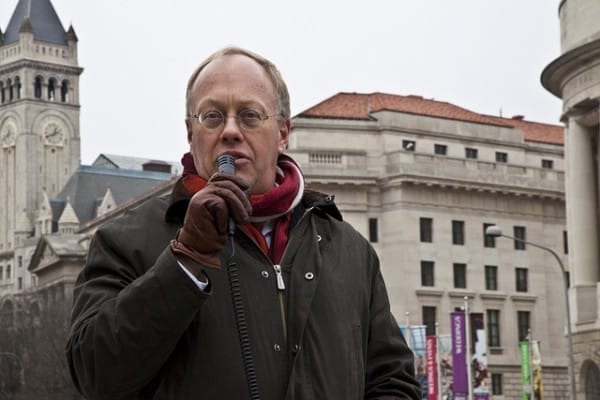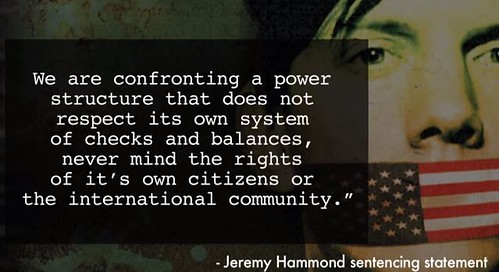[dropcap]In recent years,[/dropcap] there’s been a small genre of left-of-center journalism that, following President Obama’s lead, endeavors to prove that things on Planet Earth are not just going well, but have, in fact, never been better. This is an inherently subjective claim, of course; it requires that one buy into the idea of human progress, for one thing. But no matter how it was framed, there’s at least one celebrated leftist activist, author and journalist who’d disagree: Chris Hedges.
In fact, in his latest book, “Wages of Rebellion: The Moral Imperative of Revolt,” Hedges argues that the world is currently at a crisis point the likes of which we’ve never really seen. There are similarities between our time and the era of the 1848 revolutions throughout Europe — or the French Revolutionary era that preceded them — he says. But in many ways, climate change least among them, the stakes this time are much higher. According to Hedges, a revolution is coming; we just don’t yet know when, where, how — or on whose behalf.
Recently, Salon spoke over the phone with Hedges to discuss his book, why he thinks our world is in for some massive disruptions, and why we need revolutionaries now more than ever. A transcript of our conversation which has been edited for clarity and length can be found below.
Do you think we are in a revolutionary era now? Or is it more something on the horizon?
It’s with us already, but with this caveat: it is what Gramsci calls interregnum, this period where the ideas that buttress the old ruling elite no longer hold sway, but we haven’t articulated something to take its place.
That’s what that essay I quote by Alexander Berkman, “The Invisible Revolution,” talks about. He likens it to a pot that’s beginning to boil. So it’s already taking place, although it’s subterranean. And the facade of power — both the physical facade of power and the ideological facade of power — appears to remain intact. But it has less and less credibility.
There are all sorts of neutral indicators that show that. Low voter turnout, the fact that Congress has an approval rating of 7 percent, that polls continually reflect a kind of pessimism about where we are going, that many of the major systems that have been set in place — especially in terms of internal security — have no popularity at all.
All of these are indicators that something is seriously wrong, that the government is no longer responding to the most basic concerns, needs, and rights of the citizenry. That is [true for the] left and right. But what’s going to take its place, that has not been articulated. Yes, we are in a revolutionary moment; but maybe it’s a better way to describe it as a revolutionary process.
Is there a revolutionary consciousness building in America?
Well, it is definitely building. But until there is an ideological framework that large numbers of people embrace to challenge the old ideological framework, nothing is going to happen. Some things can happen; you can have sporadic uprisings as you had in Ferguson or you had in Baltimore. But until they are infused with that kind of political vision, they are reactive, in essence.
So you have, every 28 hours, a person of color, usually a poor person of color, being killed with lethal force — and, of course, in most of these cases they are unarmed. So people march in the streets and people protest; and yet the killings don’t stop. Even when they are captured on video. I mean we have videos of people being murdered by the police and the police walk away. This is symptomatic of a state that is ossified and can no longer respond rationally to what is happening to the citizenry, because it exclusively serves the interest of corporate power.
We have, to quote John Ralston Saul, “undergone a corporate coup d’état in slow motion” and it’s over. The normal mechanisms by which we carry out incremental and piecemeal reform through liberal institutions no longer function. They have been seized by corporate power — including the press. That sets the stage for inevitable blowback, because these corporations have no internal constraints, and now they have no external constraints. So they will exploit, because, as Marx understood, that’s their nature, until exhaustion or collapse.
What do you think is the most likely way that the people will respond to living in these conditions?
That is the big unknown. When it will come is unknown. What is it that will trigger it is unknown. You could go back and look at past uprisings, some of which I covered — I covered all the revolutions in Eastern Europe; I covered the two Palestinian uprisings; I covered the street demonstrations that eventually brought down Slobodan Milosevic — and it’s usually something banal.
As a reporter, you know that it’s there; but you never know what will ignite it. So you have Lenin, six weeks before the revolution, in exile in Switzerland, getting up and saying, We who are old will never live to see the revolution. Even the purported leaders of the opposition never know when it’s coming. Nor do they know what will trigger it.
What kind of person engages in revolutionary activity? Is there a specific type?
There are different types, but they have certain characteristics in common. That’s why I quote theologian Reinhold Niebuhr when he talks about “sublime madness.”
I think that sublime madness — James Baldwin writes it’s not so much that [revolutionaries] have a vision, it’s that they are possessed by it. I think that’s right. They are often difficult, eccentric personalities by nature, because they are stepping out front to confront a system of power [in a way that is] almost a kind of a form of suicide. But in moments of extremity, these rebels are absolutely key; and that you can’t pull off seismic change without them.
You’ve said that we don’t know where the change will come from, and that it could just as easily take a right-wing, reactionary form as a leftist one. Is there anything lefties can do to influence the outcome? Or is it out of anyone’s control?
“If we are not brutal about diagnosing what we are up against, then all of our resistance is futile. If we think that voting for Hillary Clinton … is really going to make a difference, then I would argue we don’t understand corporate power and how it works…”
There’s so many events as societies disintegrate that you can’t predict. They play such a large part in shaping how a society goes that there is a lot of it that is not in your control.
For example, if you compare the breakdown of Yugoslavia with the breakdown of Czechoslovakia — and I covered both of those stories — Yugoslavia was actually the Eastern European country best-equipped to integrate itself into Europe. But Yugoslavia went bad. When the economy broke down and Yugoslavia was hit with horrific hyperinflation, it vomited up these terrifying figures in the same way that Weimar vomited up the Nazi party. Yugoslavia tore itself to pieces.
If things unravel [in the U.S.], our backlash may very well be a rightwing backlash — a very frightening rightwing backlash. We who care about populist movements [on the left] are very weak, because in the name of anti-communism these movements have been destroyed; we are almost trying to rebuild them from scratch. We don’t even have the language to describe the class warfare that is being unleashed upon us by this tiny, rapacious, oligarchic elite. But we on the left are very disorganized, unfocused, and without resources.
In terms of a left-wing populism having to build itself back up from scratch, do you see the broad coalition against the Trans-Pacific Partnership (TPP) as a hint of what that might look like? Or would you not go that far?
No, I would.
I think that if you look at what’s happened after Occupy, it’s either spawned or built alliances with a series of movements; whether it’s #BlackLivesMatter, whether it’s the Fight for $15 campaign, whether it’s challenging the TPP. I think they are all interconnected and, often times — at least when I’m with those activists — there is a political consciousness that I find quite mature.
Are you optimistic about the future?
I covered war for 20 years; we didn’t use terms like pessimist or optimist, because if you were overly optimistic, it could get you killed. You really tried to read the landscape as astutely as you could and then take calculated risks based on the reality around you, or at least on the reality insofar as you could interpret it. I kind of bring that mentality out of war zones.
If we are not brutal about diagnosing what we are up against, then all of our resistance is futile. If we think that voting for Hillary Clinton … is really going to make a difference, then I would argue we don’t understand corporate power and how it works. If you read the writings of anthropologists, there are studies about how civilizations break down; and we are certainly following that pattern. Unfortunately, there’s nothing within human nature to argue that we won’t go down the ways other civilizations have gone down. The difference is now, of course, that when we go down, the whole planet is going to go with us.
Yet you rebel not only for what you can achieve, but for who you become. In the end, those who rebel require faith — not a formal or necessarily Christian, Jewish or Muslim orthodoxy, but a faith that the good draws to it the good. That we are called to carry out the good insofar as we can determine what the good is; and then we let it go. The Buddhists call it karma, but faith is the belief that it goes somewhere. By standing up, you keep alive another narrative. It’s one of the ironic points of life. That, for me, is what provides hope; and if you are not there, there is no hope at all.




